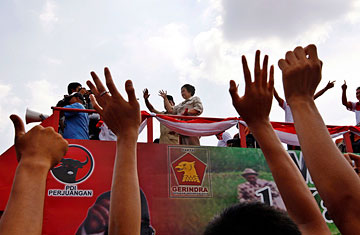
Presidential candidate Megawati Sukarnoputri, center, and her running mate Prabowo Subianto at a rally in Jakarta on June 30
Indonesia's election season came to a close on July 4, ending three weeks of campaigning by the three candidates hoping to lead the country for the next five years. With just a few days left before an expected 170 million people go to the polls on July 8, most surveys indicate that incumbent President Susilo Bambang Yudhoyono — commonly known here as "S.B.Y." — will take more than 60% of the votes, with his two challengers, former President Megawati Sukarnoputri and current Vice President Jusuf Kalla, trailing far behind.
With Yudhoyono, a former three-star general and Indonesia's first directly elected President, in front with a commanding lead, the opposition is now warning that the election — the country's second free poll since the fall of strongman General Suharto in 1998 — will be fraught with irregularities. "I have raised the issue of the voter rolls since day one," candidate Megawati, who currently stands at a distant second with a projected 20% of the vote, recently told foreign journalists. "There is a big chance that there could be a lot of cheating during the elections."
Advisors to the Megawati camp have complained that the number of polling stations has been reduced by 69,000 without explanation. "We are afraid that they have been closed in our strongholds," says Hasyim Djojohadikusomo, an advisor to Megawati and brother of her running mate, former general Prabowo Subianto. The opposition is also worried that 5 million names have been added to voter lists, many of whom, they say, are doubles, underage and even dead. "It is just days before the election and we have not received the election roll [voter list] as mandated by law."
At such a distant second, it is perhaps not surprising that Megawati, both a former President and daughter of the country's founding father, Sukarno, would begin to point fingers in the eleventh hour. Current Vice President Jusuf Kalla has also voiced concern over voter fraud. It remains to be seen, however, how much effect these complaints will have given that the elections are run by the General Elections Commission, an independent body known as the KPU. "This is an act of desperation," says Bara Hasibuan, a member of the Yudhoyono campaign team. "They should be asking the KPU and not pointing fingers at us. If the claims are true, we could lose votes just as easily as them."
Nevertheless, calls for a delay are already being discussed by the opposition. "The incompetence of the KPU has reached an intolerable level," says Ida Sudoyo, a media advisor to the Megawati campaign. "It is possible that we, along with Jusuf Kalla, will soon ask for the elections to be delayed until the proper preparations are made."
As of Sunday, members of the KPU maintained that the elections will be held as scheduled on July 8, with a second round in September if no candidate reaches the requirements needed to declare an immediate winner — a 50% national threshold and at least 20% in 17 of the country's 35 provinces. A delay in the elections is unlikely given the tens of millions of dollars that have been spent preparing for the event. Logistics in the sprawling archipelago are daunting, with some voters having to walk miles to reach the nearest polling station.
Those challenges didn't deter voters from turning out in April's legislative elections, when Yudhoyono's Democrat Party came out on top with just over 20% of the national vote. That victory was predicted accurately, which might help explain why the challengers are now using these last days to launch attacks on the credibility of the upcoming polls. Few, however, expect it to work. "S.B.Y.'s popularity has gone up and down the past year along with the rise and fall of prices for fuel and basic goods," says Purboyo Yudha Sadewa, chief economist at Danareksa Research Institute. "Now prices are stable, and so are his numbers." Indeed, there have been missteps along the way during his past five years as President — such as being misled by certain advisors and his government's failure to use 20% of the budget for education, as mandated by the national constitution. But they have not appeared to fatally dent S.B.Y.'s largely positive image. "People's memories here are short," adds Purboyo. "And for the most part they are quick to forgive."
